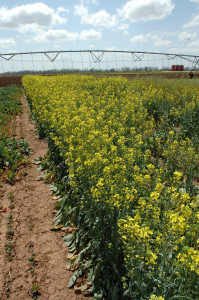College Station, Texas, USA
April 7, 2014
Canola field varieties were in full bloom amidst a backdrop of sunny skies and breezy conditions at the recent Texas A&M University field laboratory near College Station.
“Our trials look beautiful right now,” said Dr. Clark Neely, Texas A&M AgriLife Extension Service oilseed specialist, College Station, who was joined by experts at the 2014 Winter Canola Field Day. The half-day educational program attracted industry experts, university researchers and producers.
“We’re about 10 to 14 days behind because of cold weather,” he said. “About 50 percent of the varieties are flowering right now. Until now, there has been little insect and disease pressure, however, we’ve seen a substantial increase in aphid pressure in just the past week, which will need to be controlled soon. We will continue to keep an eye on insect pressure through pod fill.”
Dr. Clark Neely, Texas A&M AgriLife Extension Service oilseed specialist, was one of the featured speakers at the recent 2014 Winter Canola Field Day in College Station. (Texas A&M AgriLife Extension Service photo by Blair Fannin)
The College Station trials feature 57 entries in the National Winter Canola Variety Trial. It’s one of the largest trials ever at the Texas A&M farm, which serves as a teaching and research platform for AgriLife Extension and Texas A&M AgriLife Research.
Canola is attracting the interest of Texas farmers since it could diversify their crop portfolio, Neely said.
“That’s one of the reasons it’s taken off in the Great Plains, particularly around Oklahoma,” he said. “The reason it got going was because of weed issues in continuous wheat. When you have wheat year after year, you can have buildup of grassy weed species. Canola really fits well with wheat because it’s another winter crop.”
Neely said canola is a favorable crop to incorporate into a rotation due to additional chemical options in controlling weed problems and limiting potential weed resistance. Many popular varieties have herbicide-tolerant traits, which is another advantage for producers.
“That’s one of the big selling points,” he said. “Canola is traditionally thought of as a rotational crop, but there are some guys in Oklahoma who consider themselves canola producers that rotate with wheat. So, they really like the crop and are having a lot of success with it.”
Canola is known for not liking “wet feet” and favors soils that drain quickly, he said.
“I have seen it handle heavier soils, but I would not pick low-lying areas.”
Neely gave a presentation on insects and diseases affecting canola production in Texas. Aphids can be a problem, particularly the cabbage aphid. Farmers are advised to scout fields often and to open buds when scouting, he said.
The diamondback moth is another pest to be aware of, he said. The three-quarter-inch green larvae often appear in the fall and are found crawling on the canola leaves. They later mature into a moth with a diamond pattern and are easy to spot.

Canola field trial varieties at the Texas A&M University farm, serve as a teaching and research platform for the Texas A&M AgriLife Extension Service and Texas A&M AgriLife Research. (Texas A&M AgriLife Extension Service photo by Blair Fannin)
“The diamondback moth is a very common canola pest,” he said. “In the fall, they mostly eat holes in leaves and generally have little impact on yield; however, during winter months they migrate down into the crown and can reduce stands if plants are stressed by cold or drought.”
If using an insecticide, Neely recommended treating at the high end of the labeled insecticide rates as diamondback moth larvae are known for developing insecticide resistance.
Heath Sanders, canola agronomist with the Great Plains Canola Association, Stillwater, Okla., kicked off the program with an overview of basic canola agronomics and life cycle. He said canola was developed in the 1970s.
“Canola is one of the healthiest oils you can get,” he said.
Sanders said canola is a special type of oilseed from the rape plant that has less than 2 percent erucic acid and contains 6 percent saturated fat. There is market demand for healthy oil and profitability as prices have remained steady.
There are also rotation benefits when incorporating canola production in with winter wheat, he said.
“We are growing winter canola (in Oklahoma), but for portions of South Texas spring canola may be a better fit,” he said.
Before planting canola, Sanders advised producers to take a soil sample and have a soil test completed.
“Optimal yields can be achieved when soil pH is between 6 and 7,” he said. “Yield may be reduced by pH below 5.5.”
Sanders said canola thrives on nitrogen and the influence of fertility is an important factor.
Gene Neuens, a field representative from Producers Cooperative Oil Mill in Oklahoma City, also spoke about canola marketing at the field day. The Oklahoma City Co-op, along with ADM in Lubbock, will serve as the two closest oilseed crushers for Texas canola.
Other speakers included Mike Stamm, Kansas State canola breeder; Josh Bushong, Oklahoma State University, canola Extension specialist; and Eric Castner, DuPont Representative.